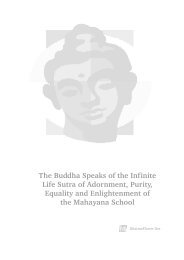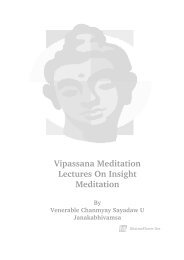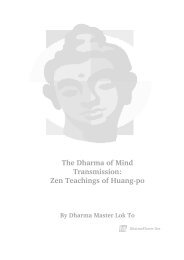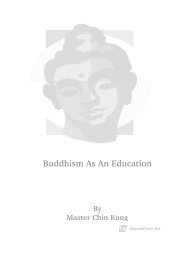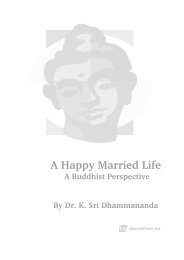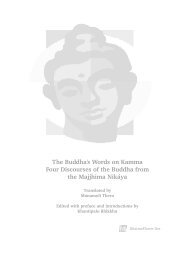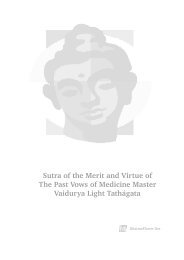THE FOUR NOBLE TRUTHS By Ajahn Sumedho - DharmaFlower.Net
THE FOUR NOBLE TRUTHS By Ajahn Sumedho - DharmaFlower.Net
THE FOUR NOBLE TRUTHS By Ajahn Sumedho - DharmaFlower.Net
You also want an ePaper? Increase the reach of your titles
YUMPU automatically turns print PDFs into web optimized ePapers that Google loves.
ealm of conditions, no two things are identical. They are all quitedifferent, infinitely variable and changing, and the more we try tomake conditions conform to our ideas, the more frustrated we get. Wetry to create each other and a society to fit the ideas we have of howthings should be, but we always end up feeling frustrated. Withreflection, we realise: ‘This is the way it is,’ this is the way things haveto be - they can only be this way.Now that is not a fatalistic or negative reflection. It is not an attitudeof: ‘That’s the way it is and there’s nothing you can do about it.’ It is avery positive response of accepting the flow of life for what it is. Even ifit is not what we want, we can accept it and learn from it.We are conscious, intelligent beings with retentive memory. We havelanguage. Over the past several thousand years, we have developedreason, logic and discriminative intelligence. What we must do isfigure out how to use these capacities as tools for realisation ofDhamma rather than as personal acquisitions or personal problems.People who develop their discriminative intelligence often end upturning it upon themselves; they become very self-critical and evenbegin to hate themselves. This is because our discriminative facultiestend to focus upon what is wrong with everything. That is whatdiscrimination is about: seeing how this is different from that. Whenyou do that to yourself, what do you end up with? Just a whole list offlaws and faults that make you sound absolutely hopeless.When we are developing Right Understanding, we use our intelligencefor reflection and contemplation of things. We also use ourmindfulness and wisdom together. So now we are using our ability todiscriminate with wisdom (vijja) rather than with ignorance (avijja).This teaching of the Four Noble Truths is to help you to use youintelligence - your ability to contemplate, reflect and think - in a wiseway rather than in a self-destructive, greedy or hateful way.RIGHT ASPIRATIONThe second element of the Eightfold path is samma sankappa.Sometimes this is translated as ‘Right Thought’, thinking in the rightway. However, it actually has more of a dynamic quality - like‘intention’, ‘attitude’ or ‘aspiration’. I like to use ‘aspiration’ which issomehow very meaningful in this Eightfold Path - because we doaspire.It is important to see that aspiration is not desire. The Pali word‘tanha’ means desire that comes out of ignorance, whereas ‘sankappa’means aspiration not coming from ignorance. Aspiration might seemlike a kind of desire to us because in English we use the word ‘desire’for everything of that nature - either aspiring or wanting. You mightthink that aspiration is a kind of tanha, wanting to become



